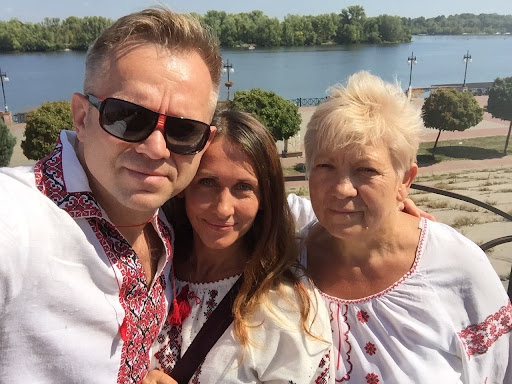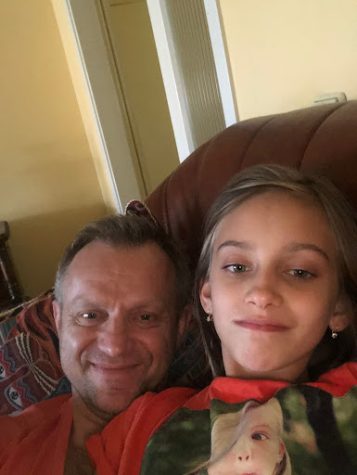It’s About Humanity: The Cruel Reality of the Russian- Ukraine War

Coach Oleg (left) with his wife, Katya (middle), and mother, Zina (right)
The spring breeze didn’t carry the usual ambrosia of sweet petals earlier this year, but was rather infected with the stench of death and destruction. Words like “Russia”, “war”, “NATO”, and “weapons” could be heard from the monotonous voices in the TV as they intoxicated the air around them with fear and anxiety. But as my city suffocated on lockdown’s chokehold, my focus shifted onto getting supplies for my science labs, buying enough food to eat when no one was allowed out of their houses, and searching every corner of the internet for toilet paper and dish soap. Amidst the frantic studying for finals, days bled hazily into one another and stress seemed to gnaw on me incessantly, I had moved across three regions. After three months of sheer chaos, Tokyo was an oasis of peace and quiet.
Due to the pandemic, I had moved back to Shanghai, a poignant city made of sunkissed jewels, from Tokyo, where I had spent the past few years before Covid-19. Nostalgia danced in the summer heat as I saw the familiar skyline and people. Nightfall covered the city with a blanket of endless ebony and precious coolness as I made my way to my old fencing club. I remember heartily greeting the head coach of EXDREAM fencing, and ex-coach of the Japanese national fencing team. Coach Oleg gave me a curt nod. We quickly began training, the exercises just as rigorous and fun as I remembered them and the people just as kindhearted and funny.
About halfway through the lesson we took a short break. My mother was standing next to Coach Oleg, her expression was stiff as she shifted on her feet. I hurriedly made my way over to them, the coach’s eyes were still stuck on his phone screen.
“This is next to my house,” he mumbled as he tilted the phone screen. “My daughter is there too.”
It was at that moment that it hit me. It was a highly pixelated picture of a bleak piece of land. Dirt and debris were scattered around a pile of whitewood and cement while fires raged in the background. I just stared at the picture as I felt my heart skip, too timid to meet his strong gaze. Coach Oleg swiped as more pictures came into view, the same heap of a broken reality caught from different angles. In a video of the same incident, there were loud distraught voices yelling over one another and alarms howled in the background as the camera quickly zoomed in on it. Ukraine. That was when I realized the headlines that had been so distant just a minute ago were right in front of me the next.
The reality of war and heartbreak had forced itself onto me like a slap in the face as I stared across the spotless gymnasium, a sharp contrast to the picture I had just seen. I couldn’t shake off the image of the demolished heath. After a few seconds, I couldn’t help but ask him to tell me about his family and situation after practice.
When I had met him a few years ago, he almost seemed to bask in sunny glory. He had been in Japan for 18 years, working as a coach, formerly of the national men’s epee team, and now in our club. He was the hero of Japanese fencing as he had led the men’s foil team to Japan’s first individual fencer silver medal as well as gold medal in team fencing. But in front of me today, all I saw was a lost and desperate father. He told me his wife and daughter were still in Kyiv, the capital of Ukraine. They had briefly gone to Italy for a few months but returned as they missed home and his mother took care of them. Speaking of his mother, the weathered lines etched across his face seemed to ease and shine, and a small smile cracked through his fatigued demeanor. His mother had hid in the undergrounds of Kyiv when the war just started, unable to fall asleep to the bombs and shellings that chanted a thunderous and ominous beat. She had gone to a military point for an automatic gun, even though she had never even held one in the entirety of her life, much less knew how to use one. Gripping the gun tightly, even as fatigue slowly lulled her to sleep each night, she was “always ready for the Russians”, according to Coach Oleg, whose eyes became glassier than ever.
The gentle aroma of roasted coffee embraced him in a hug as I looked out onto the peaceful streets of Tokyo, “What about here? Can they come to Tokyo?”
“They want to stay in Ukraine,” he explained. “We can stand our ground. He said they will take Kyiv in three days, the whole Ukraine in a week. But what now? It’s been 8 months. Nothing! Every time I give part of my salary to volunteer organization, they buy medicine, weapons, and protective gear. I know one of me is not enough, but 10 of us, 100 of us – we defend our home.”
Coach Oleg continued to show me pictures of his daughter. A 12 year old fighting the hardships of the world in her own way – attending online school as sirens wailed and alarms shrieked in the background.

At my inability to do anything, I suddenly felt helpless. Writing this and sharing his story is the least I can do. The world has yet again plunged deep into the tenebrous waters of instability, but in the asphyxiating darkness, many focus solely on the politics and forget that the lived experiences of these terrors linger closer to us than we may expect. One of these heartwrenching atrocities is the Ukraine crisis. There are many stories that are akin to this one, every tragic detail different by a mere fragment of reality, but the moral is priceless nonetheless.
“It’s about humanity,” Coach Oleg told me as we left the warm ambiance of the coffee shop, the brisk September breeze swam across the tranquil landscape of Tokyo to a less cohesive land abroad.
